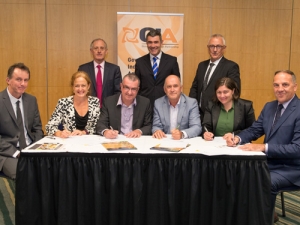Meat Industry Association CEO to Step Down
The Meat Industry Association of New Zealand (MIA) today announced that Chief Executive Officer Sirma Karapeeva has resigned from the role.
 From left to right: David Teulon (B3), Jen Scoular (NZ Avocado), Allan Pollard (Pipfruit NZ), Barry O'Neill (KVH), Rebecca Fisher (NZ Citrus Growers Inc), Andrew Coleman (MPI). Top row: Martyn Dunne (MPI), Minister for Primary Industries, Hon Nathan Guy, Philip Manson (NZ Wine Growers).
From left to right: David Teulon (B3), Jen Scoular (NZ Avocado), Allan Pollard (Pipfruit NZ), Barry O'Neill (KVH), Rebecca Fisher (NZ Citrus Growers Inc), Andrew Coleman (MPI). Top row: Martyn Dunne (MPI), Minister for Primary Industries, Hon Nathan Guy, Philip Manson (NZ Wine Growers).
An operational agreement to reduce the damaging impacts of a fruit fly incursion has been signed by a number of horticulture industry groups.
Fruit Fly Council chairman, Philip Manson says that the council is pleased to have finalised the agreement after months of negotiations amongst the parties. "This means the horticulture sector and the Ministry for Primary Industries can work together to manage and help reduce the impacts of fruit fly on the sector," says Mr Manson.
"Fruit flies are one of the biggest biosecurity threats facing horticulture. A fruit fly incursion could cost the horticulture industry up to $2.1 billion (calculated as the annual value of first point of sales). Eighty percent of this value is represented by signatories to the agreement, who will be partners in joint decision making under Government Industry Agreement (GIA) for readiness and response."
This is the first such agreement under GIA. It sets out the operational requirements for readiness and response activities and cost-sharing arrangements between Government and affected industries.
"By working together under GIA, Government and affected industries can achieve far greater outcomes than working in isolation. The agreement clearly sets out the roles and responsibilities of all the parties, and how joint activities will be funded between all the parties," says Mr Manson.
The agreement was signed by the parties at the B3 – Better Border Biosecurity Conference with the Minister for Primary Industries, Nathan Guy. Other attendees included representatives of the signing industry groups, the Ministry for Primary Industries (MPI) and the GIA Secretariat.
Initial signatories to the operational agreement are Pipfruit NZ, Kiwifruit Vine Health, New Zealand Avocado Growers Association Inc, New Zealand Citrus Growers Inc and the Ministry for Primary Industries.
For more information or to view a copy of the agreement summary, visit www.gia.org.nz.
The 5+ A Day Charitable Trust has launched a collection of affordable recipes designed to turn everyday vegetables into seasonal stars.
Jane Mellsopp has been confirmed as the new Government Appointee to the New Zealand Meat Board (NZMB).
To celebrate the tenth anniversary of its annual Good Deeds competition, Rabobank will give away $100,000 to improve rural community hubs, schools, clubrooms, and marae across New Zealand.
Agricultural and veterinary product supplier Shoof International has appointed Michaela Dumper as its new chief executive.
Federated Farmers is celebrating following the Government's announcement that young farmers will be able to use their KiwiSaver funds to buy their first home or farm.
The Meat Industry Association of New Zealand (MIA) today announced that Chief Executive Officer Sirma Karapeeva has resigned from the role.

OPINION: A mate of yours truly reckons rural Manawatu families are the latest to suffer under what he calls the…
OPINION: If old Winston Peters thinks building trade relations with new nations, such as India, isn't a necessary investment in…